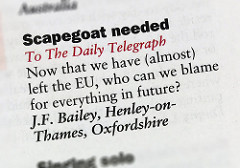Public Responsibility Attribution in the EU
 For democratic polities to command legitimacy, it is essential that the political actors responsible for policy-making can be held publicly accountable. Holding policy-makers accountable presupposes that responsibility for policies can be attributed to particular and identifiable political actors. While even in democratic states the attribution of responsibility for any given policy is hardly ever straightforward, we know relatively little on how the public attributes responsibility for the policies adopted by the European Union (EU), whose policies play an integral part in the day-to-day life of EU citizens and those affected by them.
For democratic polities to command legitimacy, it is essential that the political actors responsible for policy-making can be held publicly accountable. Holding policy-makers accountable presupposes that responsibility for policies can be attributed to particular and identifiable political actors. While even in democratic states the attribution of responsibility for any given policy is hardly ever straightforward, we know relatively little on how the public attributes responsibility for the policies adopted by the European Union (EU), whose policies play an integral part in the day-to-day life of EU citizens and those affected by them.
- In some cases – such as the failure of the EU to devise an effective border control regime, which has led to the deaths of thousands of refugees in the Mediterranean – the public attributes responsibility predominantly to EU institutions;
- in other cases – such as the failed redistribution of refugees among EU members – the public attributes responsibility mainly to EU member states.
- And in still other cases, such as the so-called welfare-migration facilitated by the EU’s freedom of movement principle, public responsibility attributions remain more or less untargeted.
Especially when the effectiveness of policies is in question, political responsibility and accountability become pressing issues:
- To whom does the European public attribute political responsibility?
- When is responsibility predominantly attributed to actors at the member state level, when are attributions primarily targeted at actors at the EU level, and when are attributions untargeted?
By answering these questions, the project aims at improving our understanding of public responsibility attributions (PRAs) for policies enacted by the EU. To this end, we will analyze PRAs by means of media content analysis of the coverage of three different sets of EU policies in the European quality press:
- environmental policies,
- financial policies, as well as
- migration policies.
To explain variation in PRAs across cases we suggest – as a theoretical point of departure – that the structure of EU policy-making as well as the structure of EU policy implementation shape how the public attributes responsibility for EU policies.
The project is funded by the Deutsche Forschungsgemeinschaft (DFG) (Projekt number 391007015).
Picture taken by Brett Jordan and found on Flickr.

